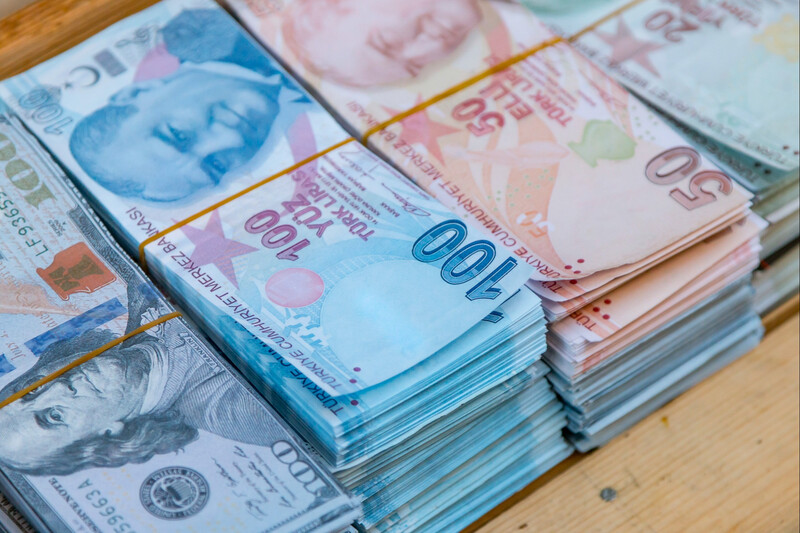En pleine crise de change, la livre turque a perdu plus de 50 % face au dollar depuis le début de l’année 2021, dont 45 % entre début novembre et le 20 décembre. Suite aux mesures d’urgence récemment annoncées par le président Recep Tayyip Erdogan, la devise turque a regagné 15 % en quelques heures. Face à ces fluctuations, les banques européennes optent pour des stratégies diverses.
Livre turque : des mesures d’urgence pour éviter la catastrophe
Si les grandes banques européennes ont, pour la plupart, choisi de ne pas se retirer du pays, elles doivent faire face aux importantes fluctuations des taux de change. Contrairement aux pratiques habituelles, le président Recep Tayyip Erdogan continue à s’opposer aux taux d’intérêt élevés, persuadé qu’une hausse des taux ne ferait qu’aggraver l’inflation.
Fidèle à cette logique, il a incité la Banque centrale turque à réduire son taux d’intérêt directeur à plusieurs reprises, de façon à le maintenir au-dessous du niveau d’inflation. Par conséquent, les Turcs qui plaçaient de l’argent sur leurs comptes bancaires perdaient de l’argent au lieu d’épargner, ce qui aurait pu entraîner une grave crise économique si la population avait décidé de retirer massivement son argent.
Recep Tayyip Erdogan s’est finalement décidé à prendre des mesures d’urgence lundi. Pour rassurer les Turcs et éviter un scénario catastrophe, il a déclaré que les dépôts bancaires en livres turques seraient désormais liés au cours du dollar. En cas de dépréciation de la devise turque, les écarts seront comblés par des versements de l’État.
Ces annonces ont eu un effet positif sur la devise turque, qui s’est redressée sur le marché des changes sans pour autant se stabiliser.
Des banques européennes plus ou moins exposées à la dette turque
Face à cette situation très incertaine, les grandes banques européennes ont adopté des stratégies différentes et ne sont pas toutes pareillement exposées aux risques induits par l’instabilité de la livre turque.
Ainsi, la banque italienne UniCredit a choisi dès 2019 de quitter la Turquie, et de céder d’ici le printemps 2022 les 20 % de capital de Yapi Kredi, la troisième banque turque, qu’elle détenait encore.
A contrario, le groupe bancaire espagnol BBVA (Banco Bilbao Vizcaya Argentaria) a quant à lui décidé de racheter la totalité du capital de l’établissement turc Garanti, qu’il possédait déjà à 49,85 %. Carlos Torres, le président de BBVA, se montre confiant et légitime la décision du groupe par sa bonne connaissance de la devise du pays, grâce à sa présence sur le marché turc depuis une décennie.
Une confiance qui n’a visiblement pas gagné les investisseurs : après l’annonce de Carlos Torres, le cours de BBVA a chuté de 24 % avant de remonter au bout de quelques jours. Le groupe néerlandais ING est lui aussi présent en Turquie, de même que BNP Paribas, qui a acquis 72 % de la holding contrôlant la banque turque TEB (Turk Economi Bankasi).
D’après les données de la Banque des règlements internationaux (BRI), les deux pays européens les plus exposés, fin juin 2021, à la dette turque, sont l’Espagne à hauteur de 53 milliards d’euros et la France avec 22,1 milliards d’euros.
Le Royaume-Uni et l’Allemagne courent moins grands risques, avec une exposition d’environ 12 milliards d’euros chacun. Pour certains, l’exposition est directe en raison d’activités de banque de détail en Turquie, tandis que pour d’autres, qui détiennent en portefeuille des titres de dette turque, l’exposition est indirecte.
Toutefois, les grandes banques européennes présentes en Turquie expliquent leur choix par une prise de risque assumée. Certes, la devise est instable, mais ce pays émergent possède également un réel dynamisme et compte plus de 80 millions d’habitants.
De plus, la chute de la livre turque présente autant de dangers que d’opportunités, avec notamment pour BBVA la possibilité d’un rachat du capital de Garanti à un prix 3 fois moins élevé qu’en 2014 et en 2017, dates des précédentes opérations.
D’après le groupe new-yorkais Citi, la banque la plus exposée est, sans surprise, l’espagnole BBVA, dont 20 % des profits provenaient de la Turquie en 2020. Pour ING, ce chiffre se limite à 4 %, et BNP Paribas réduit les risques avec seulement 2,1 % de ses résultats courants avant impôt en provenance de Turquie.
